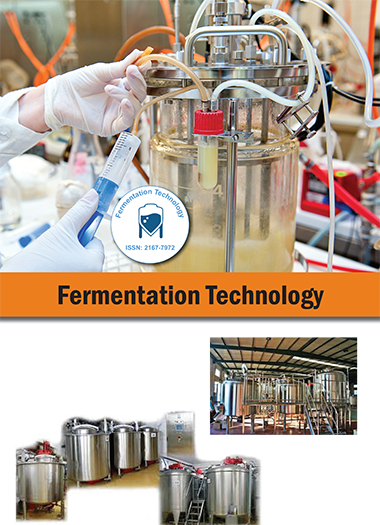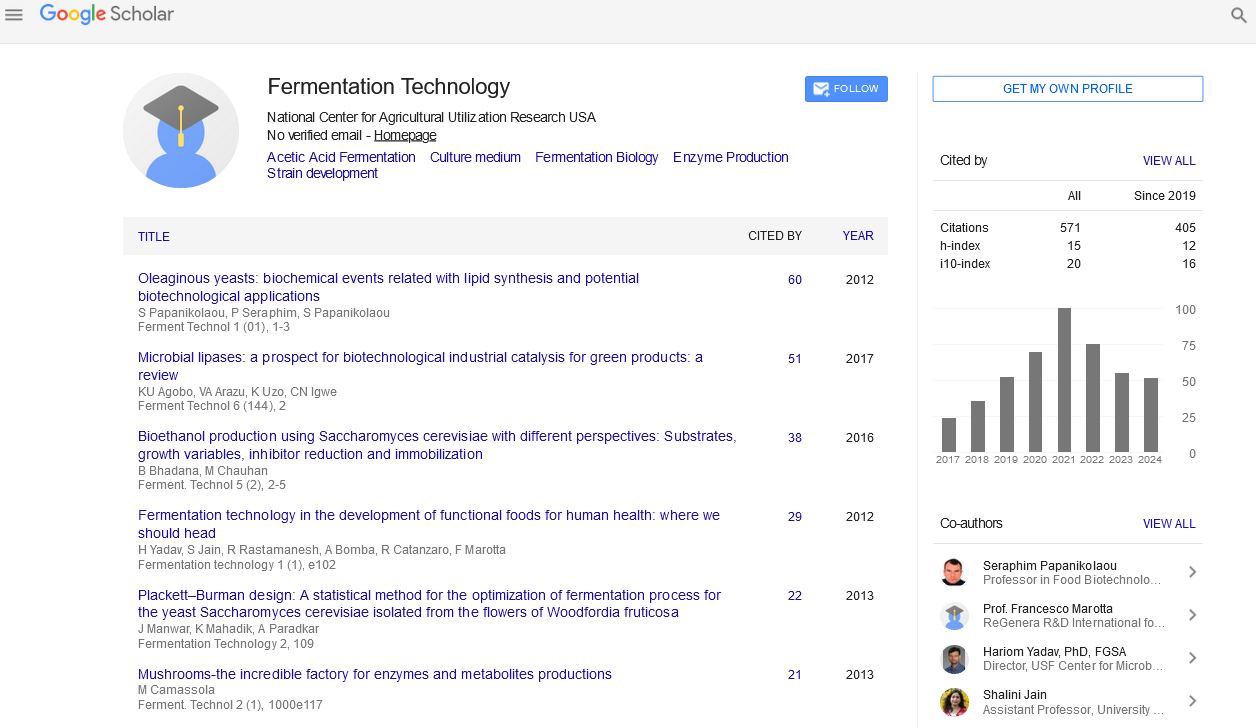Indexed In
- Open J Gate
- Genamics JournalSeek
- Access to Global Online Research in Agriculture (AGORA)
- RefSeek
- Hamdard University
- EBSCO A-Z
- OCLC- WorldCat
- Publons
Useful Links
Share This Page
Journal Flyer

Open Access Journals
- Agri and Aquaculture
- Biochemistry
- Bioinformatics & Systems Biology
- Business & Management
- Chemistry
- Clinical Sciences
- Engineering
- Food & Nutrition
- General Science
- Genetics & Molecular Biology
- Immunology & Microbiology
- Medical Sciences
- Neuroscience & Psychology
- Nursing & Health Care
- Pharmaceutical Sciences
Opinion Article - (2024) Volume 13, Issue 1
Fermentation and Health: The Monascus Impact on Fish-Based Foods
Jun Hie*Received: 26-Feb-2024, Manuscript No. FMT-24-25557; Editor assigned: 28-Feb-2024, Pre QC No. FMT-24-25557 (PQ); Reviewed: 13-Mar-2024, QC No. FMT-24-25557; Revised: 20-Mar-2024, Manuscript No. FMT-24-25557 (R); Published: 27-Mar-2024, DOI: 10.4172/2167-7972.24.13.173
Description
The utilization of novel techniques and ingredients to increase the nutritional value and digestibility of food components has obtained considerable attention in recent years. Among these innovative approaches, the application of Monascus, a genus of filamentous fungi, to improving the in vitro digestion and fermentation characteristics of fish protein has been shown to be an interesting method. This article aims to explore the effects of Monascus application on the digestion and fermentation processes of fish protein and clarifies its potential implications for human health and food industry practices.
Enzymatic diversity of Monascus species
Monascus species have long been recognized for their various enzymatic activities and metabolic capabilities. Generally, they have been utilized in food fermentation processes, particularly in the production of fermented foods like red yeast rice and soy sauce. More recently, researchers have explored the potential of Monascus in improving the nutritional profile and functional properties of various food substrates, including fish protein.
Effects on in vitro digestion
Studies have indicated that the inclusion of Monascus into fish protein substrates can lead to significant changes in the digestion kinetics and nutrient release profiles. The enzymatic activities of Monascus, including proteases and lipases, have been shown to facilitate the analysis of complex protein structures into smaller peptides and amino acids, thereby improving the digestibility of fish protein. Moreover, Monascus-derived metabolites such as organic acids and bioactive peptides may exert synergistic effects on digestive processes, further promoting nutrient absorption.
Significance of fermentation
In addition to its impact on digestion, Monascus application holds potential for improving the fermentation characteristics of fish protein. By modulating the microbial composition and metabolic activities within the gastrointestinal tract, Monascus metabolites can influence fermentation processes such as shortchain fatty acid production and microbial protein synthesis. These fermentation by-products not only contribute to gastrointestinal health but also improve the taste, texture, and overall quality of fermented fish products.
Health benefits and nutritional importance
The improved digestibility and fermentation of fish protein through Monascus provide a wide range of health benefits for consumers. Improved nutrient bioavailability can support optimal growth, development, and metabolic functions in individuals, particularly those with increased nutritional requirements, such as children, pregnant women, and the elderly. Furthermore, the production of bioactive compounds during Monascus-mediated fermentation may provide additional health-promoting properties, including antioxidant, antimicrobial, and immunomodulatory effects.
Challenges and considerations
Despite the potential of Monascus application in improving the nutritional value of fish protein, several challenges and considerations cause attention. Issues related to safety, following regulations, and consumer acceptance necessitate comprehensive risk assessments and market evaluations. Furthermore, optimizing fermentation conditions and understanding the exchange between Monascus and fish protein substrates are essential for maximizing the efficacy and reproducibility of desired outcomes.
In conclusion, the utilization of Monascus in improving the in vitro digestion and fermentation characteristics of fish protein represents a novel approach with significant implications for human health and food industry innovation. By improving nutrient bioavailability, promoting gastrointestinal health, and providing functional properties to fish products, Monascus application offers a potential method for meeting the evolving needs and preferences of consumers. Moving forward, further study efforts and collaborative initiatives are essential to control the potential of Monascus in transforming the nutritional profile of fish-based foods.
Citation: Hie J (2024) Fermentation and Health: The Monascus Impact on Fish-Based Foods. Ferment Technol. 13:173.
Copyright: © 2024 Hie J. This is an open-access article distributed under the terms of the Creative Commons Attribution License, which permits unrestricted use, distribution, and reproduction in any medium, provided the original author and source are credited.

